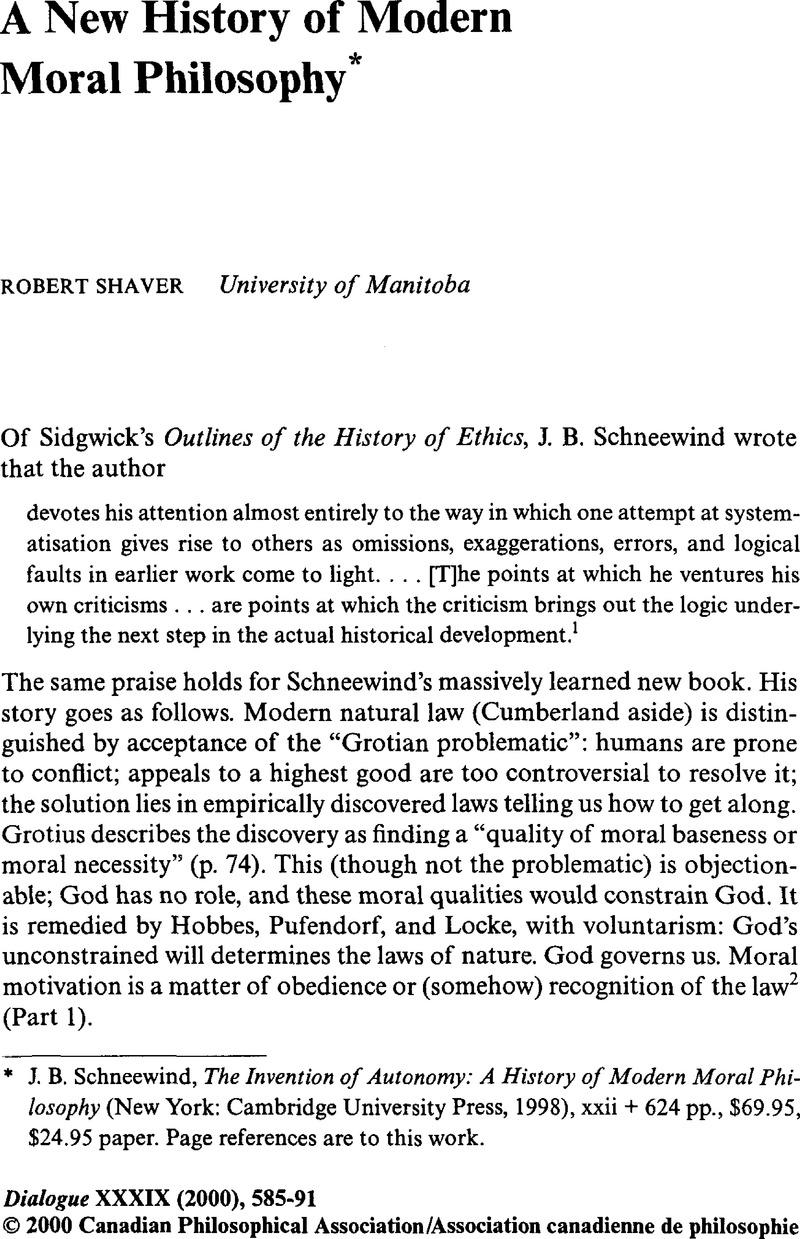Published online by Cambridge University Press: 13 April 2010

1 Schneewind, J. B., Sidgwick's Ethics and Victorian Moral Philosophy (Oxford: Clarendon Press, 1977), pp. 416–17.Google Scholar
2 Oddly, Schneewind does not stress the standard natural law argument against self-governance: we cannot really bind ourselves, since we can always release ourselves from self-imposed bonds. (He notes Barbeyrac's use of the argument [p. 258].) This remains a popular theme in discussions of normativity, as evidenced, for example, by Kripke's treatment of rule following.
3 One might quibble with Schneewind's organization—Machiavelli, Montaigne, and Charron seem odd in 1, Pascal in 3, Voltaire, La Mettrie, and Diderot in 4; Spinoza might be read as a more extreme Hobbes; some of the figures seem to be included more for completeness of coverage than thematic contribution—but any ordering and selection is bound to be artificial, and since the chapters are quite self-contained (and the index excellent), the reader is free to rearrange.
4 Those most interested in autonomy or Kant should read Chapter 23 first, referring back to the rest of the book from there.
5 For example, Schneewind's interpretation of Hobbes relies on the necessity of death-avoidance; all Hobbesian obligations are self-imposed; the egoist strain in Clarke, so unsuited to his official austere view, is not pursued; textual worries about the supremacy of conscience in Butler, posed by the “cool hour” passage and Sermon 3.9, are treated lightly; Hume explains rather than justifies; his moral sentiment is “a spontaneous feeling … not a trained sensitivity” (p. 361).
6 It is the highlight, not because Leibniz and Barbeyrac distinguish themselves, but because of Schneewind's probing to find the deeper issue. Barbeyrac's best objection is that Leibniz has “neither exact nor well-connected ideas of the nature and the inherent strength of Duty.” Schneewind's gloss is that Barbeyrac and Pufendorf see the need for special moral motivation giving special worth, motivation that is not good-directed (and which is not, of course, decently developed until Kant). This is what voluntarism gets right and perfectionism gets wrong (pp. 256–59).
7 Some of these histories are more accessible in the brilliant papers leading up to the book. Indeed, in one respect the papers are preferable to the book, since they are compactly organized by theme rather than by philosopher. To my mind, the best are ”The Misfortunes of Virtue,” Ethics, 101 (1990)Google Scholar; “Modern Moral Philosophy: From Beginning to End?” in Philosophical Imagination and Cultural Memory, edited by Cook, Patricia (Durham: Duke, 1993)Google Scholar; “Kant and Natural Law Ethics,” Ethics, 104 (1993)Google Scholar; and “Voluntarism and the Foundations of Ethics,” Proceedings and Addresses of the American Philosophical Association, 70 (1996).Google Scholar
8 The same background helps with one of Hume's famous comments to Hutcheson: “I wish from my heart, I could avoid concluding, that since morality … is determined merely by sentiment, it regards only human nature and human life. … [T]he consequences are very momentous. … If morality were determined by reason, that is the same to all rational beings: but nothing but experience can assure us, that the sentiments are the same. What experience have we with respect to superior beings? How can we ascribe to them any sentiments at all?” (Letter 16 in Hume's Letters, edited by Greig, J. Y. T. [Oxford: Oxford University Press, 1932])Google Scholar. The background does not, however, explain Hume's apparent concern.
9 In the case of Clarke, he sees anti-voluntarism as “the motivation for some of the views Clarke defends in philosophy” (p. 319).
10 Schneewind also cites Kant's treatment of law as basic to show that he accepts the problematic (p. 519). But this is not part of the problematic itself, and some of those who reject the problematic treat law as basic (Cumberland), while some who accept it do not (Hume).
11 One of Schneewind's formulations makes the point clearly: “Malebranche's radical conviction is that happiness is not at all the point of morality” (p. 230; see also p. 321).
12 Hume's letter to Hutcheson, quoted above, does suggest that empiricism, when combined with sentimentalism, would rule out knowledge of moral community with God.
13 Schneewind suggests, in passing, one Lockean argument for voluntarism that seems to depend on distinctive Lockean views. Moral ideas are mixed modes; mixed modes correspond to nothing in nature; hence, there can be no natural moral constraints on God (p. 150)
14 Parfit, Derek, Reasons and Persons (Oxford: Oxford University Press, 1984), p. 453.Google Scholar
15 Schneewind is dubious about history revealing progress, given the differing questions and assumptions he finds (p. 553). He might, however, see progress in the sense of increasing problem-solving ability (as post-Kuhnian philosophers suggest). Or he might see progress in answering particular questions, where these recur. His positioning of Kant as the culmination of this history may reflect some such judgement. (Thanks to Carl Matheson and Joyce Jenkins for these points, and to the latter, along with two anonymous referees, for comments on drafts of this notice.)